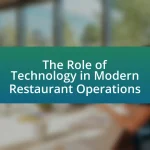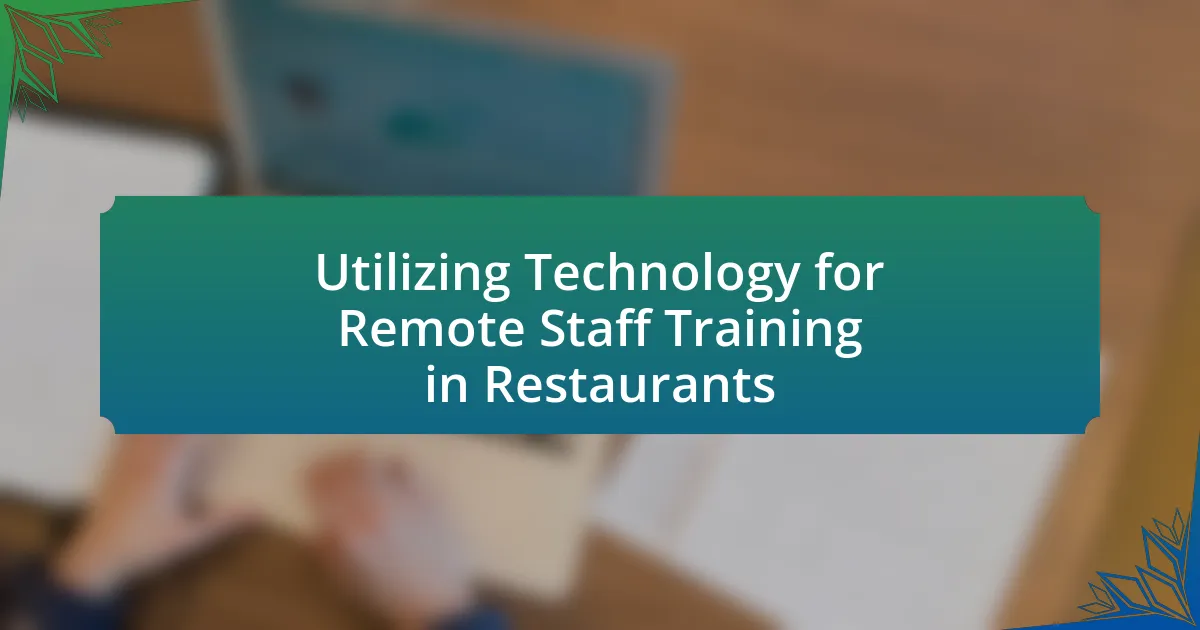The article focuses on developing leadership skills among restaurant managers, emphasizing the importance of effective communication, team management, problem-solving, and adaptability. It explores how these skills impact employee performance and customer satisfaction, supported by industry research. Additionally, the article discusses the significance of emotional intelligence, decision-making, and strategies for skill development, including training programs and mentorship. It also addresses challenges faced by restaurant managers, such as high turnover and stress management, while providing practical tips for enhancing leadership capabilities in a fast-paced environment.

What are the key leadership skills needed for restaurant managers?
Key leadership skills needed for restaurant managers include effective communication, team management, problem-solving, and adaptability. Effective communication ensures that managers can convey expectations clearly to staff and address customer concerns promptly. Team management involves motivating and guiding employees to work cohesively, which is crucial in a fast-paced environment. Problem-solving skills enable managers to quickly address operational challenges, ensuring smooth service delivery. Adaptability is essential as restaurant managers must respond to changing circumstances, such as staffing issues or customer preferences, to maintain operational efficiency. These skills are supported by industry studies indicating that strong leadership directly correlates with improved employee performance and customer satisfaction in the restaurant sector.
How do effective communication skills impact restaurant management?
Effective communication skills significantly enhance restaurant management by fostering clear interactions among staff, improving customer service, and facilitating efficient operations. When restaurant managers communicate effectively, they can convey expectations, provide feedback, and resolve conflicts promptly, which leads to a more cohesive team environment. Research indicates that restaurants with strong communication practices experience higher employee satisfaction and lower turnover rates, ultimately contributing to better service quality and increased customer loyalty. For instance, a study published in the Journal of Hospitality Management found that effective communication directly correlates with improved team performance and customer satisfaction scores in the restaurant industry.
What techniques can enhance communication among staff?
Effective techniques to enhance communication among staff include regular team meetings, clear communication channels, and active listening practices. Regular team meetings foster an environment for open dialogue, allowing staff to share ideas and concerns, which can lead to improved collaboration and problem-solving. Establishing clear communication channels, such as designated platforms for messaging or updates, ensures that information is disseminated efficiently and reduces misunderstandings. Active listening practices encourage staff to engage fully in conversations, validating their contributions and promoting a culture of respect and understanding. These techniques are supported by research indicating that effective communication in teams leads to higher employee satisfaction and productivity, as highlighted in studies by the Harvard Business Review.
How does communication influence customer satisfaction?
Effective communication significantly influences customer satisfaction by ensuring that customer needs and expectations are clearly understood and met. When restaurant managers communicate effectively with both their staff and customers, it leads to improved service delivery, which directly enhances the dining experience. Research indicates that 70% of customers cite effective communication as a key factor in their satisfaction levels, highlighting its critical role in fostering positive interactions and resolving issues promptly. Furthermore, clear communication helps in setting realistic expectations, which can prevent misunderstandings and dissatisfaction.
Why is emotional intelligence important for restaurant managers?
Emotional intelligence is crucial for restaurant managers because it enhances their ability to understand and manage their own emotions as well as those of their staff and customers. This skill fosters better communication, conflict resolution, and team cohesion, which are essential in a high-pressure environment like a restaurant. Research indicates that leaders with high emotional intelligence can improve employee satisfaction and retention rates, leading to a more stable workforce and better customer service. For instance, a study published in the Journal of Organizational Behavior found that emotional intelligence positively correlates with leadership effectiveness, highlighting its importance in managerial roles.
What are the components of emotional intelligence in leadership?
The components of emotional intelligence in leadership include self-awareness, self-regulation, motivation, empathy, and social skills. Self-awareness allows leaders to recognize their emotions and understand how they affect their performance and interactions. Self-regulation enables leaders to manage their emotions and impulses, fostering a stable work environment. Motivation drives leaders to pursue goals with energy and persistence, which is crucial in the fast-paced restaurant industry. Empathy helps leaders understand and respond to the emotions of their team members, enhancing communication and collaboration. Finally, social skills facilitate effective relationship management, enabling leaders to inspire and influence their teams positively. Research by Goleman (1995) emphasizes that these components are essential for effective leadership, particularly in high-stress environments like restaurants, where emotional dynamics significantly impact team performance and customer satisfaction.
How can emotional intelligence improve team dynamics?
Emotional intelligence can significantly improve team dynamics by enhancing communication, fostering collaboration, and resolving conflicts effectively. When team members possess high emotional intelligence, they are better equipped to understand and manage their own emotions as well as empathize with others, leading to a more cohesive work environment. Research indicates that teams with high emotional intelligence experience increased trust and cooperation, which are essential for effective teamwork. For instance, a study published in the Journal of Organizational Behavior found that emotional intelligence positively correlates with team performance, as it facilitates better interpersonal relationships and reduces misunderstandings. This improvement in team dynamics ultimately contributes to higher productivity and job satisfaction among restaurant staff.
What role does decision-making play in restaurant leadership?
Decision-making is crucial in restaurant leadership as it directly influences operational efficiency, team dynamics, and customer satisfaction. Effective leaders make informed choices that optimize resources, enhance service quality, and drive profitability. For instance, a study by the National Restaurant Association indicates that 70% of restaurant failures are linked to poor management decisions, highlighting the importance of strategic decision-making in sustaining business success. Additionally, leaders who engage their teams in the decision-making process foster a collaborative environment, which can lead to improved employee morale and retention. Thus, decision-making serves as a foundational skill that shapes the overall effectiveness of restaurant management.
What strategies can managers use for effective decision-making?
Managers can use data-driven analysis, collaborative decision-making, and scenario planning as effective strategies for decision-making. Data-driven analysis involves utilizing quantitative data to inform choices, which enhances objectivity and reduces biases; for instance, a study by the Harvard Business Review found that companies using data analytics in decision-making improved their performance by 5-6%. Collaborative decision-making encourages input from team members, fostering diverse perspectives and increasing buy-in, which is supported by research from the Institute for Corporate Productivity showing that organizations with collaborative cultures are 5 times more likely to be high-performing. Scenario planning allows managers to anticipate potential outcomes and prepare for various situations, a strategy highlighted in a report by McKinsey & Company, which states that organizations employing scenario planning are better equipped to navigate uncertainty.
How does decision-making affect restaurant operations?
Decision-making significantly impacts restaurant operations by influencing efficiency, customer satisfaction, and profitability. Effective decisions regarding menu design, staffing, and inventory management can streamline operations, reduce costs, and enhance the dining experience. For instance, a study by the National Restaurant Association found that restaurants with well-defined decision-making processes experience 20% higher profitability compared to those without. This demonstrates that strategic choices directly correlate with operational success, highlighting the importance of strong leadership skills among restaurant managers in making informed decisions.

How can restaurant managers develop their leadership skills?
Restaurant managers can develop their leadership skills by engaging in continuous education and training programs focused on leadership and management techniques. These programs often include workshops, seminars, and online courses that cover essential topics such as team dynamics, conflict resolution, and effective communication. Research indicates that managers who participate in leadership training see a 20% increase in employee satisfaction and retention rates, as highlighted in a study by the American Management Association. Additionally, seeking mentorship from experienced leaders within the industry can provide practical insights and guidance, further enhancing a manager’s leadership capabilities.
What training programs are available for restaurant managers?
Training programs available for restaurant managers include the ServSafe Manager Certification, which focuses on food safety and sanitation, and the National Restaurant Association’s Management Training Program, which covers operational management and leadership skills. Additionally, programs like the American Culinary Federation’s Certified Executive Chef program enhance culinary leadership, while online platforms like Coursera and LinkedIn Learning offer courses on restaurant management and leadership development. These programs are designed to equip restaurant managers with essential skills to effectively lead teams and manage operations, ensuring compliance with industry standards and improving overall restaurant performance.
How do mentorship opportunities contribute to skill development?
Mentorship opportunities significantly enhance skill development by providing personalized guidance and feedback from experienced professionals. This relationship allows mentees to gain insights into industry best practices, refine their leadership abilities, and develop problem-solving skills through real-world scenarios. Research indicates that 70% of learning occurs through experiential activities, which mentorship facilitates by allowing managers to apply theoretical knowledge in practical settings. Furthermore, a study by the Association for Talent Development found that mentoring can lead to a 20-30% increase in productivity, underscoring its effectiveness in fostering essential skills among restaurant managers.
What role does on-the-job training play in leadership growth?
On-the-job training is crucial for leadership growth as it provides practical experience and immediate application of skills in real-world scenarios. This type of training allows restaurant managers to develop essential leadership qualities such as decision-making, team management, and conflict resolution while actively engaging with their teams. Research indicates that experiential learning, which is a key component of on-the-job training, significantly enhances leadership effectiveness by fostering adaptability and problem-solving skills. For instance, a study published in the Journal of Leadership Education found that managers who participated in structured on-the-job training programs demonstrated a 25% increase in leadership competencies compared to those who did not receive such training. This evidence underscores the importance of on-the-job training in cultivating effective leaders within the restaurant industry.
How can feedback be utilized to enhance leadership skills?
Feedback can be utilized to enhance leadership skills by providing actionable insights that inform a leader’s decision-making and interpersonal effectiveness. Regular feedback from team members and peers allows restaurant managers to identify strengths and areas for improvement, fostering a culture of continuous learning. For instance, a study published in the Journal of Applied Psychology found that leaders who actively seek and apply feedback demonstrate higher levels of employee engagement and performance. This evidence supports the notion that constructive feedback not only aids in personal development but also positively impacts team dynamics and overall restaurant success.
What methods can managers use to solicit constructive feedback?
Managers can solicit constructive feedback through methods such as regular one-on-one meetings, anonymous surveys, and feedback sessions. Regular one-on-one meetings create a safe space for open dialogue, allowing employees to express their thoughts directly. Anonymous surveys encourage honest feedback without fear of repercussions, which can lead to more candid responses. Feedback sessions, where team members discuss performance and areas for improvement collectively, foster a culture of transparency and collaboration. Research indicates that organizations utilizing these methods experience higher employee engagement and satisfaction, which supports the effectiveness of these feedback solicitation techniques.
How can feedback be effectively implemented for improvement?
Feedback can be effectively implemented for improvement by establishing a structured process that includes regular, specific, and actionable feedback sessions. This approach allows restaurant managers to identify areas for growth and develop their leadership skills. Research indicates that organizations that implement regular feedback mechanisms see a 14.9% increase in employee performance (Gallup, 2016). By fostering an environment where feedback is encouraged and valued, managers can enhance their decision-making and team dynamics, ultimately leading to improved operational efficiency and employee satisfaction.
What are the benefits of networking for restaurant managers?
Networking provides restaurant managers with access to valuable industry contacts, resources, and knowledge that can enhance their leadership skills. By connecting with other professionals, restaurant managers can share best practices, gain insights into market trends, and learn about innovative operational strategies. Research indicates that 70% of jobs are found through networking, highlighting its importance in career advancement and opportunities for mentorship. Additionally, networking can lead to partnerships that improve supply chain efficiency and customer engagement, ultimately contributing to a restaurant’s success and growth.
How can networking lead to leadership opportunities?
Networking can lead to leadership opportunities by facilitating connections that enhance visibility and credibility within the industry. When restaurant managers engage in networking, they build relationships with peers, mentors, and industry leaders, which can result in recommendations for leadership roles or invitations to participate in high-profile projects. Research indicates that 70% of jobs are found through networking, highlighting its effectiveness in career advancement. Additionally, networking allows managers to share knowledge and best practices, further establishing their expertise and leadership potential in the restaurant sector.
What resources are available for building a professional network?
Professional networking resources include industry associations, social media platforms, and networking events. Industry associations, such as the National Restaurant Association, provide access to a community of professionals, educational resources, and events that facilitate networking. Social media platforms like LinkedIn enable restaurant managers to connect with peers, share insights, and join relevant groups focused on leadership and management in the restaurant sector. Networking events, including conferences and local meetups, offer opportunities for face-to-face interactions, fostering relationships that can lead to mentorship and collaboration. These resources are essential for restaurant managers aiming to enhance their leadership skills and expand their professional connections.

What challenges do restaurant managers face in developing leadership skills?
Restaurant managers face several challenges in developing leadership skills, primarily due to high employee turnover, time constraints, and the need for effective communication. High employee turnover in the restaurant industry, which averages around 75% annually, creates instability that hinders the development of consistent leadership practices. Time constraints arise from the demanding nature of restaurant operations, leaving little opportunity for managers to engage in leadership training or mentorship. Additionally, effective communication is often compromised in fast-paced environments, making it difficult for managers to convey their vision and motivate staff. These factors collectively impede the growth of leadership skills essential for successful restaurant management.
How do high-stress environments affect leadership development?
High-stress environments significantly impact leadership development by fostering resilience and adaptability in leaders. In the context of restaurant management, high-pressure situations, such as peak service hours or crisis management, compel managers to make quick decisions, enhancing their problem-solving skills and emotional intelligence. Research indicates that leaders who thrive in stressful conditions often develop stronger communication skills and team cohesion, as they learn to motivate and support their staff under pressure. A study published in the Journal of Leadership Studies found that leaders exposed to high-stress scenarios are more likely to exhibit transformational leadership qualities, which are essential for effective team management in dynamic environments.
What strategies can managers employ to manage stress effectively?
Managers can employ several strategies to manage stress effectively, including time management, delegation, and promoting a positive work environment. Time management allows managers to prioritize tasks, reducing feelings of being overwhelmed; studies show that effective time management can lead to a 25% increase in productivity. Delegation empowers team members, alleviating the burden on managers and fostering a sense of ownership among staff, which can enhance morale and reduce stress levels. Additionally, promoting a positive work environment through open communication and team-building activities has been linked to lower stress levels and improved employee satisfaction, as evidenced by research from the American Psychological Association, which indicates that supportive workplace cultures can significantly mitigate stress.
How can stress management improve leadership capabilities?
Stress management enhances leadership capabilities by enabling leaders to maintain composure, make informed decisions, and foster a positive work environment. Effective stress management techniques, such as mindfulness and time management, allow leaders to reduce anxiety and improve focus, which is crucial in high-pressure settings like restaurants. Research indicates that leaders who practice stress management are more likely to exhibit emotional intelligence, leading to better team dynamics and employee satisfaction. For instance, a study published in the Journal of Occupational Health Psychology found that leaders who engage in stress management practices report higher levels of job performance and lower turnover rates among their teams.
What are common barriers to effective leadership in restaurants?
Common barriers to effective leadership in restaurants include high employee turnover, lack of training, and communication issues. High employee turnover disrupts team cohesion and leads to inconsistent service, making it difficult for leaders to establish a stable environment. Lack of training prevents staff from developing necessary skills, which can hinder operational efficiency and employee confidence. Communication issues, such as unclear expectations or inadequate feedback, create misunderstandings and reduce team morale, ultimately impacting service quality and customer satisfaction. These barriers collectively challenge restaurant managers in their efforts to lead effectively and maintain a productive workplace.
How can managers overcome resistance to change among staff?
Managers can overcome resistance to change among staff by actively involving employees in the change process. Engaging staff in discussions about the changes fosters a sense of ownership and reduces anxiety. Research indicates that when employees participate in decision-making, their commitment to the change increases, leading to a smoother transition. For instance, a study published in the Journal of Organizational Change Management found that organizations that implemented participatory change strategies experienced 30% less resistance compared to those that did not. This evidence supports the effectiveness of involving staff in the change process as a strategy to mitigate resistance.
What role does organizational culture play in leadership challenges?
Organizational culture significantly influences leadership challenges by shaping the values, behaviors, and expectations within a workplace. In the context of restaurant management, a strong organizational culture can either support or hinder a manager’s ability to lead effectively. For instance, a culture that promotes teamwork and open communication facilitates collaboration among staff, enabling managers to address issues promptly and foster a positive work environment. Conversely, a culture characterized by rigid hierarchies and poor communication can create barriers for leaders, making it difficult to implement changes or motivate employees. Research indicates that organizations with a positive culture experience 30% higher employee engagement, which directly correlates with improved leadership effectiveness and reduced turnover rates. Thus, the alignment of organizational culture with leadership practices is crucial for overcoming challenges in restaurant management.
What practical tips can enhance leadership skills for restaurant managers?
To enhance leadership skills for restaurant managers, effective communication is essential. Managers should practice active listening to understand team concerns and foster an open dialogue, which can lead to improved team morale and productivity. Additionally, setting clear expectations and providing constructive feedback helps employees understand their roles and areas for improvement, thereby increasing accountability.
Implementing regular training sessions can also enhance leadership skills by keeping managers updated on industry trends and best practices. Research indicates that organizations with strong training programs see a 24% higher profit margin, demonstrating the financial benefits of investing in leadership development.
Moreover, encouraging teamwork through team-building activities can strengthen relationships among staff, leading to a more cohesive work environment. A study by the Harvard Business Review found that teams with strong interpersonal relationships are 50% more productive.
Lastly, practicing adaptability in decision-making allows managers to respond effectively to challenges, which is crucial in the fast-paced restaurant industry. By embracing change and being open to new ideas, managers can lead their teams more effectively.
How can self-assessment tools aid in leadership development?
Self-assessment tools aid in leadership development by enabling individuals to evaluate their strengths, weaknesses, and leadership styles. These tools provide structured feedback that helps restaurant managers identify areas for improvement, fostering self-awareness and personal growth. Research indicates that self-assessment can lead to enhanced leadership effectiveness; for instance, a study published in the Journal of Leadership Education found that self-reflection significantly improved leadership skills among participants. By utilizing self-assessment tools, restaurant managers can create targeted development plans that align with their specific leadership challenges and organizational goals.
What daily practices can managers adopt to improve their leadership skills?
Managers can adopt daily practices such as active listening, setting clear goals, and providing regular feedback to improve their leadership skills. Active listening fosters open communication and builds trust within the team, which is essential for effective leadership. Setting clear goals helps managers align their team’s efforts and measure progress, enhancing accountability. Providing regular feedback encourages continuous improvement and reinforces positive behaviors. Research indicates that leaders who engage in these practices are more likely to create a motivated and high-performing team, as evidenced by a study published in the Journal of Leadership Studies, which found that effective communication and goal-setting significantly correlate with team performance outcomes.




